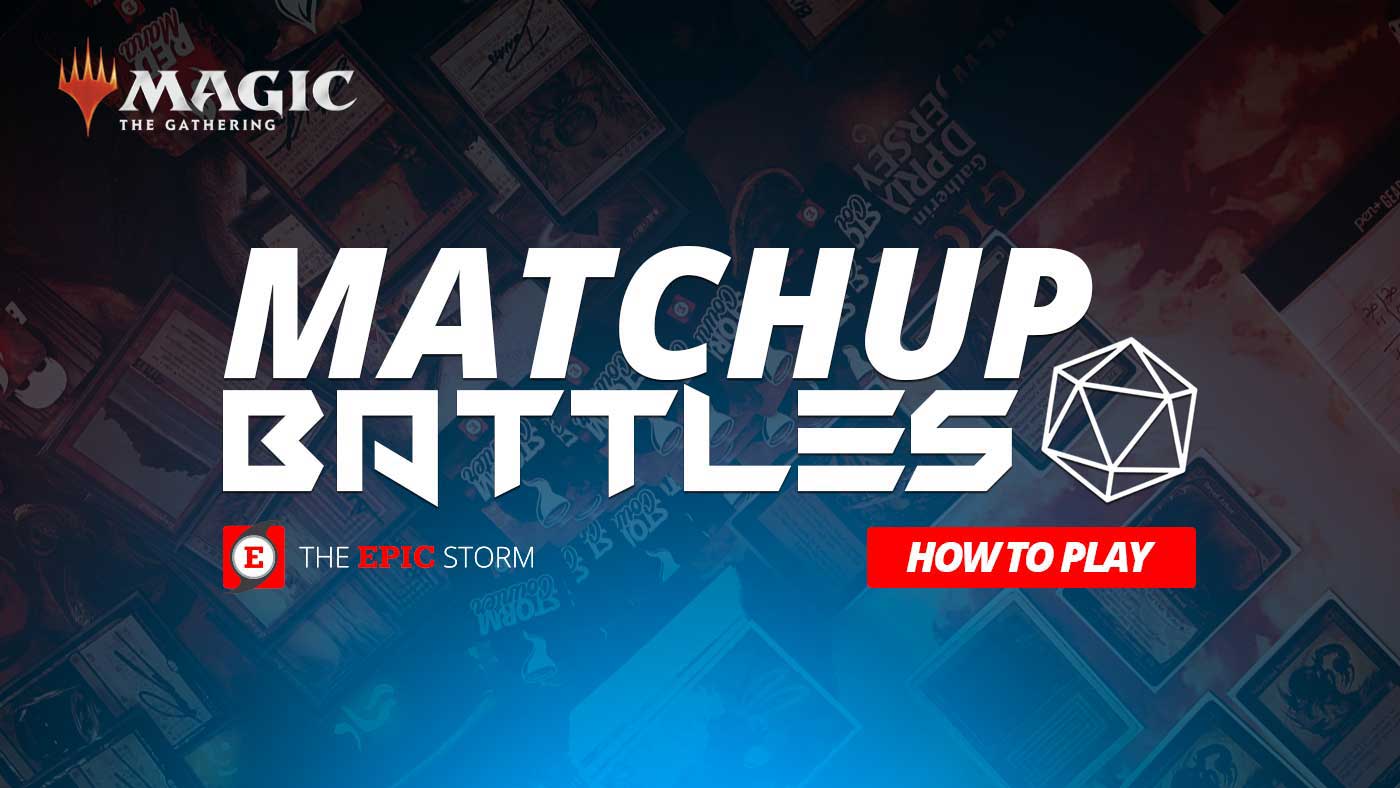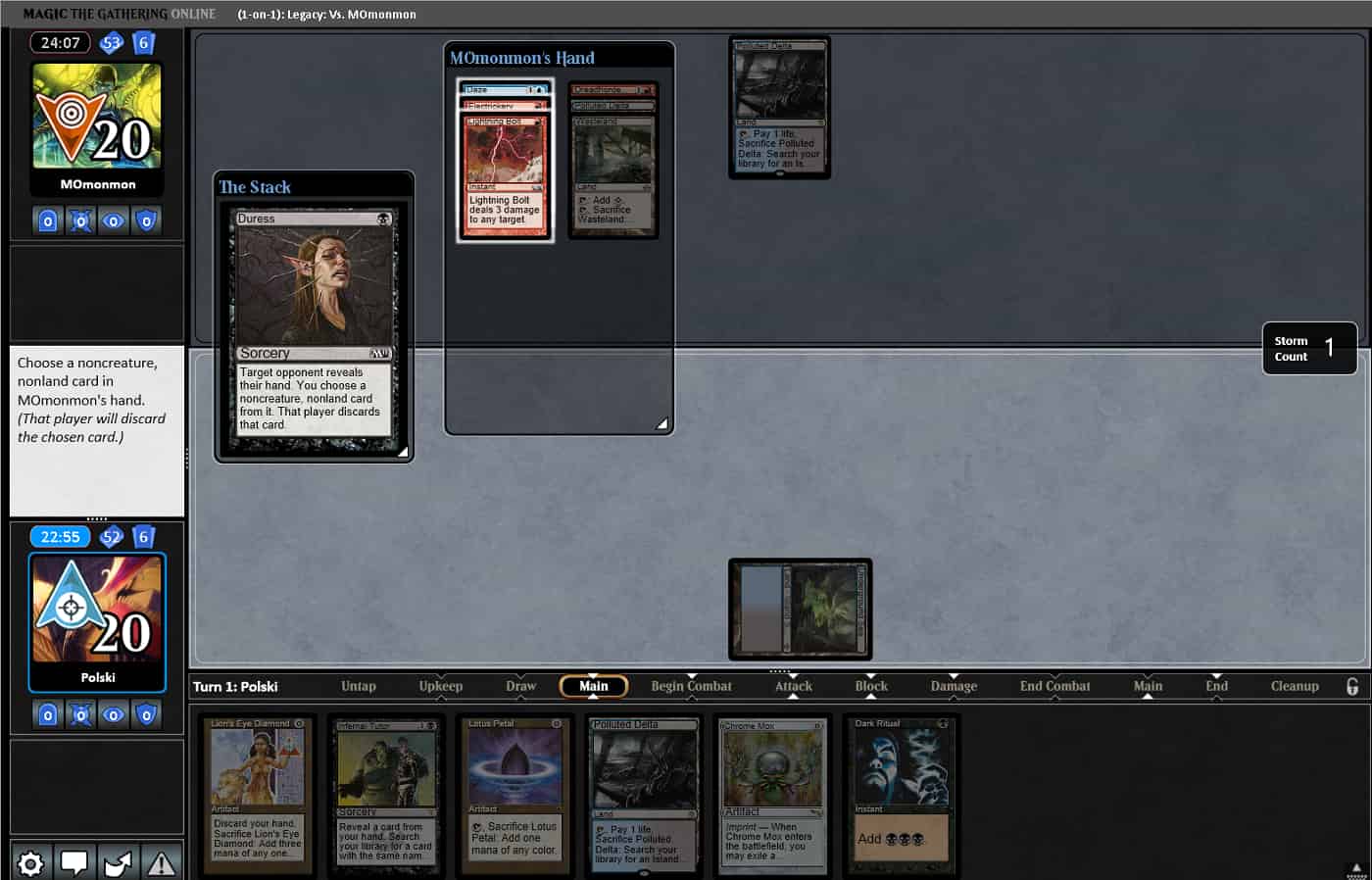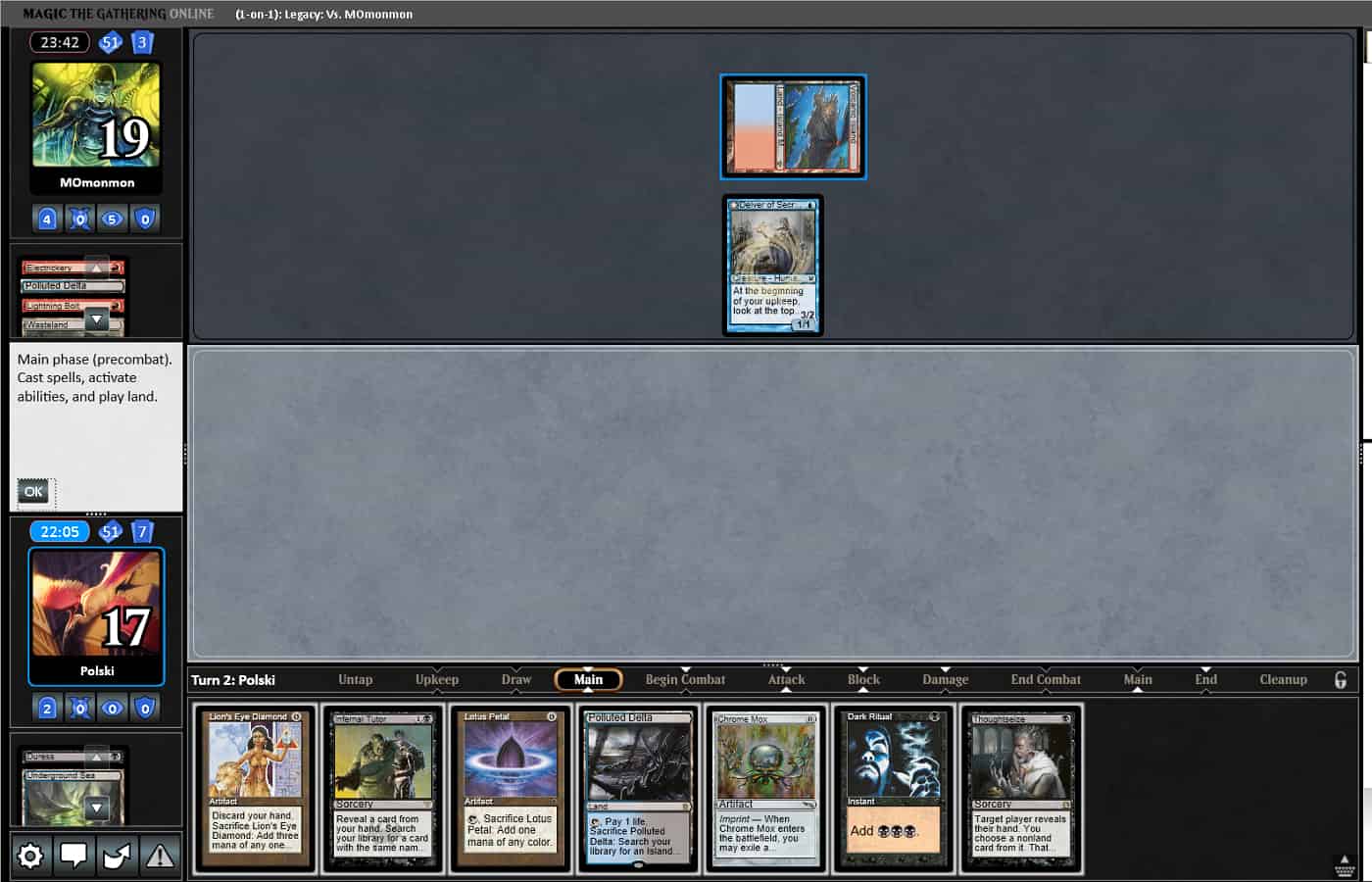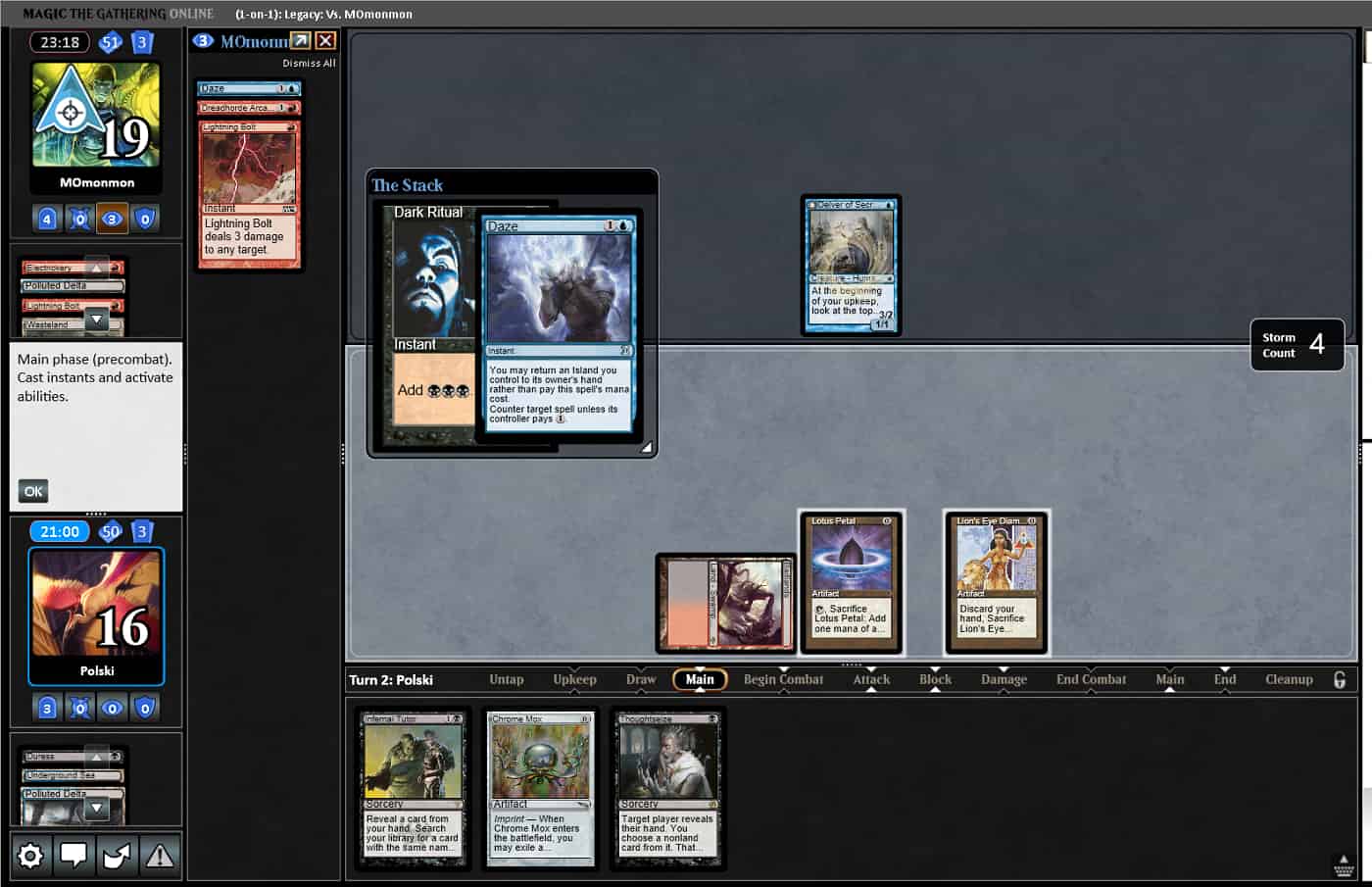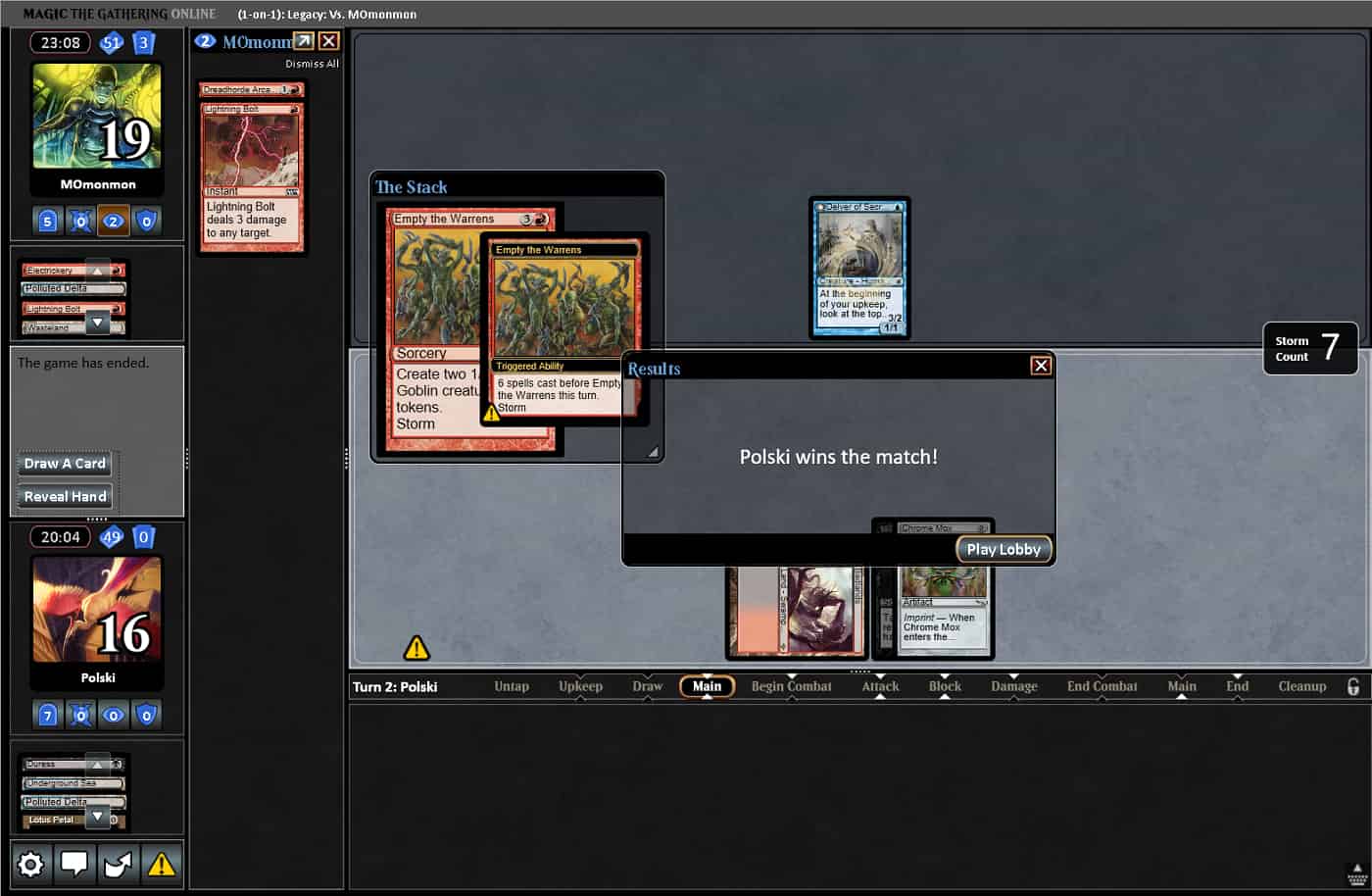Grixis Delver's primary game plan is to stick an early threat, such as
Delver of Secrets or
Young Pyromancer, and use cards like
Daze and
Wasteland to disrupt the opponent’s initial development while killing the opponent quickly. There are, and have been, many different flavors of
Delver of Secrets decks ever since its printing quite a few years ago. Grixis Delver would be considered a tempo deck, and even before
Delver of Secrets was printed tempo has always been a strategy in eternal formats. Learning and understanding the skills in this matchup will help you for years to come because
Delver of Secrets and tempo strategies will not be going away, and will help you against other current
Delver of Secrets decks.
How does Grixis Delver matchup against TES?
Delver of Secrets, Young Pyromancer - Both of these cards can put a pretty fast clock against us, and while it may not seem like it on paper they can kill very quickly. We need every turn we can get to make as many land drops to help beat all of their soft permission, but when we are getting beat down quickly it means we can't sit around all day and reliably do that before our life total dwindles. This is one of the reasons that these two cards are important for Grixis Delver, because if they don't have one of these two cards then that means we are not under any real pressure and can take our time combo-ing off to play around any of their counters and recover from a potential Wasteland. Young Pyromancer is also uniquely important because in the mid-game it could make our Empty the Warrens unreliable as a win condition if they make enough tokens as a defense.Thoughtseize - There is a reason we also play
Thoughtseize, because it is the best discard spell right now. The opponent can use
Thoughtseize to take our key card in our hand buying them several turns to just find another discard or counterspell. Delaying our combo is even more brutal if we are being beaten down by a
Delver of Secrets.
Spell Pierce,
Daze - Most lists I have seen run 4
Daze and 2-3
Spell Pierce and it's because of these cards that prevent us from going off a lot of the time on turns 1 or 2 on the draw and turns 2 and 3 on the play because of how likely it is that they have one. These cards also make the fundamental turns in this matchup 3-4 because it allows us to play around these cards a little better by making land drops and using our discard spells more effectively instead of just trying to combo off as soon as possible and running right into all of this soft permission.
Force of Will - The best counterspell in Legacy.
Force of Will usually requires an answer in the form of a discard spell because we can't really combo off into it unless the opponent counters the wrong spell or messes up. No matter how late the game goes we can never just play around it. We need to bait them into countering a non-important card or find a discard spell for it.
Wasteland – I covered playing around
Wasteland in my previous TES Matchup Battles articles and it still holds weight here. Beating
Wasteland is going to be more about your skill in legacy and not so much about the matchup in particular. Some hints for beating these cards are fetching the basic
Swamp if you can afford it. That is why it's there, but not all hands allow you to do this, so making this evaluation of when you can afford to will be key in beating Wasteland in all matchups that have it.
Dreadhorde Arcanist - The latest addition to Grixis and UR Delver. Being able to recast cards like
Lightning Bolt,
Thoughtseize and cantrips for free is a big deal. Not just in this matchup, but in Legacy, casting spells for free is powerful. With
Dreadhorde Arcanist we know any of these spells could be cast a second time, and that is a huge advantage to searching for more counters with a cantrip, taking a lot of damage with double
Lightning Bolt or getting hit with
Thoughtseize twice could be backbreaking. This can be slow against us, but if we have a slower hand then
Dreadhorde Arcanist can take over the game.
Deck List
Ways to win this matchup



Killing Them and Our Game Plan When evaluating my opening hand there are a couple of things I consider. The first is whether or not my hand is resilient against Wasteland. Grixis Delver plays four copies and we can't afford to have our hand be weak against it. One of the easiest ways to lose the game is to die to Wasteland. Another thing to consider when evaluating your hand and game plan is to be mindful or their soft permission spells like Daze and Spell Pierce. If an opening hand just folds to one of these cards it's a consideration for a mulligan or to play differently to avoid being blown out. We want to value our discard spells to taking Force of Will or one of their more important counters, so running cards into a potential Daze is unadvised. We want to make decisions to just play through or around their soft counters.Grixis Delver can have fast starts with a flipped Delver of Secrets and Lightning Bolt, so it's important to consider alternative ways to win outside of Ad Nauseam as you progress through the game. I would consider the key turns of the matchup to be 3-4. We are in no real hurry to try to jam on our first opportunity. The opponent can't punish us with a lock piece or a combo of their own, so I tend to play out a few turns to play around soft permission spells, develop my mana, and use discard spells to clear the way. One of the worst feelings is just jamming and losing to a Spell Pierce or Daze when you could have waited a turn and won. Not every matchup gives you the luxury of waiting for one more turn, but in most cases, this is one of them. Like I mentioned in the sideboarding section, Empty the Warrens is our primary way to win the game. It's quick, better against counters, and they play very few sweepers or ways to beat it once it's resolved. Focusing on these concepts while playing against Grixis Delver will definitely make the matchup much easier for you to navigate. Sideboarding
One of our best cards in this matchup is Empty the Warrens. It's very good because it allows us to combo off faster than Ad Nauseam. Grixis Delver's main way to win the game is with their namesake card, Delver of Secrets, providing a fast clock, and that speed from Empty the Warrens allows us to race effectively. The opponent having the ability to do quick damage to us also makes Ad Nauseam get worse as the game progresses, where Empty the Warrens can still easily win the game from a lower life total. Naturally drawn Empty the Warrens is ideal because it makes it easy to combo through counterspells. The opponent is often waiting to use their counters on a tutor, but if we use several rituals into an Empty the Warrens they could be left having to counter single copies of the storm trigger. Grixis Delver plays very few cards that allow them to beat a resolved Empty the Warrens. They aren't playing too many sweepers, and their best way is through their own tokens from Young Pyromancer. When bringing in the additional copies of Empty the Warrens I find it to be a good idea to trim some copies of our other tutors. We will just get cluttered with too many pay-off cards.
(adsbygoogle = window.adsbygoogle || []).push({});
Game Play
I win the die roll and we both keep our opening 7 cards. I have about the best hand for this matchup. I have the ability to play a land and start with Thoughtseize. As long as my opponent doesn't have two copies of Force of Will and blue cards then I can use the Lotus Petal and both copies of Rite of Flame to cast Empty the Warrens for 10 goblins. That's the line I want to take.
I have the ability to play a land and start with Thoughtseize. As long as my opponent doesn't have two copies of Force of Will and blue cards then I can use the Lotus Petal and both copies of Rite of Flame to cast Empty the Warrens for 10 goblins. That's the line I want to take. So, Thoughtseize resolves and the coast is clear. The opponent has nothing to stop me from going for Empty the Warrens here. I end up taking the Delver of Secrets just to remove a blocker, but I don't think it matters. I play out the Lotus Petal, my rituals, and then Empty the Warrens to make 10 goblins. This is a great example of how good Empty the Warrens is in this matchup.
So, Thoughtseize resolves and the coast is clear. The opponent has nothing to stop me from going for Empty the Warrens here. I end up taking the Delver of Secrets just to remove a blocker, but I don't think it matters. I play out the Lotus Petal, my rituals, and then Empty the Warrens to make 10 goblins. This is a great example of how good Empty the Warrens is in this matchup. 1-0The opponent concedes and we are off to the sideboard. I sideboard exactly like mentioned above and take the draw for game 2. The past month or so the deck list has been in flux with cards like Duress and Defense Grid. In this particular game I was using Duress, but moving forward I will have Defense Grid instead.We both keep our opening 7, and my hand is great. Very similar to game 1 with a quick hand and a discard spell to clear the way.
1-0The opponent concedes and we are off to the sideboard. I sideboard exactly like mentioned above and take the draw for game 2. The past month or so the deck list has been in flux with cards like Duress and Defense Grid. In this particular game I was using Duress, but moving forward I will have Defense Grid instead.We both keep our opening 7, and my hand is great. Very similar to game 1 with a quick hand and a discard spell to clear the way. My opponent just leads off the game with a fetch land and passes. On my turn, I lead off with the Duress hoping to clear the way to win on the second turn.
My opponent just leads off the game with a fetch land and passes. On my turn, I lead off with the Duress hoping to clear the way to win on the second turn. The opponent also has a pretty good hand. This is a tough decision on which card to take too. The Daze in combination with Wasteland may slow me down just enough for them to find more disruption. Electrickery also means I can't go for Empty the Warrens at all. Because of the Wasteland I want to be going for Empty the Warrens because it costs less mana. I end up taking the Electrickery and hoping I can play through Daze within a turn or two. I also can't beat Daze this turn because I don't have a card to put under the Chrome Mox, so either way, a crucial spell could get countered this turn. There's no way to combo through Daze this turn. I also can't take the Daze and go for Ad Nauseam here. Just not enough mana.
The opponent also has a pretty good hand. This is a tough decision on which card to take too. The Daze in combination with Wasteland may slow me down just enough for them to find more disruption. Electrickery also means I can't go for Empty the Warrens at all. Because of the Wasteland I want to be going for Empty the Warrens because it costs less mana. I end up taking the Electrickery and hoping I can play through Daze within a turn or two. I also can't beat Daze this turn because I don't have a card to put under the Chrome Mox, so either way, a crucial spell could get countered this turn. There's no way to combo through Daze this turn. I also can't take the Daze and go for Ad Nauseam here. Just not enough mana. The opponent starts their turn off by playing a Delver of Secrets that they just drew and then using their Wasteland that I knew about. For my turn, I needed to hit any colored spell to be able to imprint onto Chrome Mox to be able to combo off. Luckily, I did. I know my opponent's full hand, so I have full information. I need to be able to combo off through their Daze. I actually want them to cast their Daze here to get +1 storm, so I need to think how I can bait them into countering a card that's not important.
The opponent starts their turn off by playing a Delver of Secrets that they just drew and then using their Wasteland that I knew about. For my turn, I needed to hit any colored spell to be able to imprint onto Chrome Mox to be able to combo off. Luckily, I did. I know my opponent's full hand, so I have full information. I need to be able to combo off through their Daze. I actually want them to cast their Daze here to get +1 storm, so I need to think how I can bait them into countering a card that's not important. I try to get my opponent to counter the Dark Ritual here by leaving the Chrome Mox in my hand. By doing this I allow the opponent to think that they are taking me off a different color of mana. Had I played out the Chrome Mox then I could just pay using that and still keep my Lotus Petal around. This would not encourage the opponent to cast their Daze. So, obviously, I pay for Daze and continue combo-ing off and then Infernal Tutor for Empty the Warrens. Once Empty the Warrens goes on the stack the opponent concedes.
I try to get my opponent to counter the Dark Ritual here by leaving the Chrome Mox in my hand. By doing this I allow the opponent to think that they are taking me off a different color of mana. Had I played out the Chrome Mox then I could just pay using that and still keep my Lotus Petal around. This would not encourage the opponent to cast their Daze. So, obviously, I pay for Daze and continue combo-ing off and then Infernal Tutor for Empty the Warrens. Once Empty the Warrens goes on the stack the opponent concedes. 2-0These games went about as good as I could have asked for. I had really good hands and my cards lined up well against my opponent's. My opponent also did have good hands, but I think this match really showed the strength of Empty the Warrens. Hopefully, you enjoyed this article, and until next time, I wish you the best of luck in your own testing!
2-0These games went about as good as I could have asked for. I had really good hands and my cards lined up well against my opponent's. My opponent also did have good hands, but I think this match really showed the strength of Empty the Warrens. Hopefully, you enjoyed this article, and until next time, I wish you the best of luck in your own testing!
